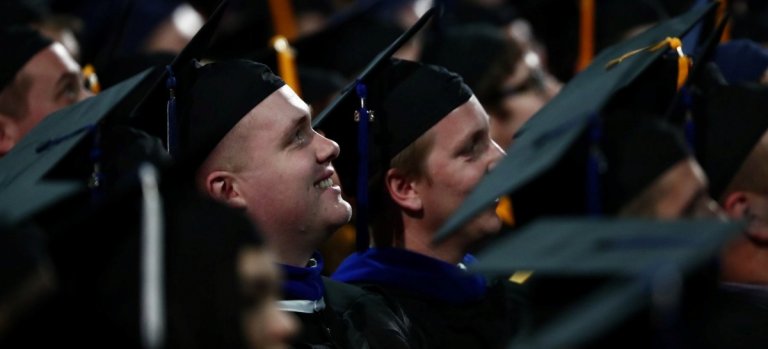
“Teacher, which is the greatest commandment in the Law?”
Jesus replied: “‘Love the Lord your God with all your heart and with all your soul and with all your mind”. This is the first and greatest commandment. And the second is like it: “Love your neighbor as yourself.” All the Law and the Prophets hang on these two commandments.”
The role of Christianity in higher education is often linked to the above Great Commandment (Matthew 22:36-40), which tells us to love God with our hearts, minds and souls. A Christian college is thus; one that educates so students will be equipped to think in a Christian manner and perform skillfully in whatever vocation God has chosen for them. They are to be agents of change based on a “fully formed Christian world and life view”.
This exemplifies the starkest difference between faith-based universities with other secular colleges: a commitment to faith.
In the US and other countries where the main religion is Christianity, faith-based universities predominantly refer to Christian institutions. Some of the world’s most revered colleges and universities – particularly in the US – started off as institutions of faith (either in mission or affiliation). This includes Harvard, Yale and Dartmouth (Puritan), College of William and Mary (Church of England), Princeton (Presbyterian) and Rutgers University (Dutch Reformed Church).
Today, the Council for Christian Colleges & Universities (CCCU) accredits more than 180 Christ-centered institutions which enrol more than 520,000 students worldwide, according to its website. More than 150 are located in the US and Canada, teaching more than 350 undergraduate major and 185 graduate majors to around 460,000 students.
Of the 1,024 religiously-affiliated higher education institutions, 287 are Roman Catholic, 225 are Bible Colleges, 232 are seminaries and the rest are made up of schools that identify as Jewish, Mormon, and more.
But how do these colleges differ from their secular counterparts in terms of teaching?
Like all higher education institutions, the curriculum is based on gaining knowledge as well as the hard and soft skills needed to prepare for our chosen careers. In Christian colleges and universities, however, the curriculum has an added feature: the integration of Christian principles with traditional academic fields.
.@PeppLaw alumna Rebecca Harkness (JD ’07) discovered her calling to serve kids in her community through a Craigslist ad. Meet the attorney that represents foster care social workers for the L.A. County Department of Children and Family Services.https://t.co/1if4qoMGuz pic.twitter.com/6FwVmVZ6H7
— Pepperdine University (@pepperdine) September 26, 2018
For example, at Arizona Christian University, the Liberal Arts Humanities Sequence “reclaims a Christian worldview of the liberal arts”. Completing the sequence means learning about philosophies, history, scientific discovery, artistic reactions to historical events and ideas “all filtered through a biblical worldview lens and the truth of Scripture”.
According to the CCCU, its accredited institutions share these three basic educational commitments: 1) Integration of biblical truth in the spiritual aspect and academic enterprise of the institution; 2) Moral and spiritual formation of students; and 3) Graduating students who make a difference for the common good as redemptive voices in the world.
The last one reflects these universities’ different perspective when it comes to career preparation.
Speaking to Forbes, Rick Ostrander, PhD, Vice President for Academic Affairs and Professional Programs for the Council for Christian Colleges & Universities said: “What our schools tend to do when they talk about ‘career,’ we tend to use terms like ‘calling’ and ‘vocation’.”
“We believe that God gives students particular talents but also desires. Our goal as Christian colleges is to help students discern where in the world they can be most beneficial, not just success financially or professionally, but where they can do the most good.”
Off-campus, spiritual developments are usually further enhanced through co-curricular activities and community service projects. Student-led focus groups that closely examine and discuss the Bible are common too, as is chapel services and mentorship from spiritual guidance counselors.
Thank you for your question! Davidson College currently has 13 Christian groups on campus, including RUF, Ukrik, Wesley, and Campus Outreach. For more information check out our website! https://t.co/yaX4F2vuWc
— Davidson Chaplains’ Office (@dc_chaplain) January 23, 2018
These activities range from the more traditional to the more lenient, depending on each particular college or university. At Brigham Young University, the Honor Code prohibits foul language, tobacco, alcohol and other vices. Whereas others like the College of the Holy Cross are more lenient and have more religious diversity.
Males and females usually live in separate dorms as administrators fear sex outside marriage, though many allow co-mingling of the sexes on certain hours and days.
Greg Leeper, Associate Dean of students at Trinity International University in Deerfield told the Christian Science Monitor: “We need to provide for solid parameters and accountability, and that expresses itself through separate living spaces, while encouraging positive interaction as well.”
Liked this? Then you’ll love…
South African court bars schools from promoting any one religion
Harvard offers free online course to teach the world about religion







